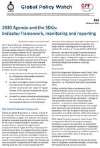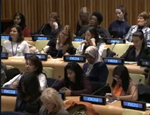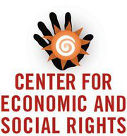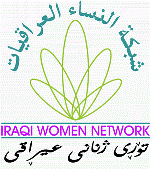Social Watch News
|
Published on Fri, 2016-03-18 17:21
|
Published on Fri, 2016-03-18 12:50
On 11 March 2016 the UN Statistical Commission agreed “as a practical starting point” with the proposed global indicator framework by which to measure progress towards the 17 goals and 169 targets of the 2030 Agenda for Sustainable Development. It recognized that the development of a robust and high quality indicator framework is a process that will need to continue over time and authorized the Interagency and Expert Group for Sustainable Development Goals (IAEG-SDGs) to continue its work
|
Published on Thu, 2016-03-17 20:23
The two-day UNCTAD expert meeting (16-17 March) on investment, innovation and entrepreneurship will be taking stock of recent developments in investment policy at the national, bilateral, regional and multilateral levels, in particular reform efforts related to the International Investment Agreements (IIA) regime.
According to UNCTAD, the Multi-Year Expert Meeting on Investment, Innovation and Entrepreneurship for Productive Capacity-Building and Sustainable Development will also address policy perspectives with regards to science, technology and innovation (STI) and provide an update on entrepreneurship policies, in the context of the Sustainable Development Goals (SDGs).
|
Published on Thu, 2016-03-17 19:36
The days leading to the adjournment of the Philippine National Congress every three years have always been an uneventful political time.
At about this time, Congress is a picture of empty chairs and half-lit hallways as most legislators would have already been prematurely campaigning for their re-election or that of a family members’ new election bid rather than burdening themselves with attending sessions.
|
|
Published on Fri, 2016-03-11 12:26
|
Published on Fri, 2016-03-11 12:07
During the United Nations observance of International Women's Day 2016, Barbara Adams from Global Policy Forum and Social Watch addresses the obstacles to Women's Rights: the unfair global trade and investment system and the lack of a debt workout mechanism deviate the resources that should ensure an universal social protection floor.
|
Published on Thu, 2016-03-10 13:06
This week, the UN Statistical Commission convenes for its annual meeting in New York. At the top of its agenda will be the latest report of the Inter-Agency and Expert Group on Sustainable Development Goal Indicators (IAEG-SDGs), which presents a final proposal for global indicators to monitor the SDGs. In the run-up to the Commission, various civil society groups have expressed their concern about particular indicators or missing indicators, as well as the opaque decision-making process.
|
Published on Thu, 2016-03-10 09:00
Financiers can have significant influence over the operations of multinational companies and their role needs to be the subject of greater interrogation, in theory, policy and practice. Financial institutions are the less visible players in the work of corporations. This is probably why, in the international business and human rights debate, there is little focus on the role of financial institutions. But the lack of focus remains strange given the indispensable and powerful role played by those who finance the operations of corporations. Part of the reason for this, as Dowell-Jones and Kinley point out, is that human rights lawyers and actors are not au fait with financial doctrine and language. In order to address the role – both positive and negative – of financial institutions, we need to remedy the inability to understand financial language. This was part of the motivation behind the Wits University Round Tables in 2011 which brought together bankers, activists and academics.
|
Published on Mon, 2016-03-07 14:13
As global women movement celebrates International Women's Day on March 8th, while everyone is silent listening to the anthem of freedom and peace, and what has been achieved in progress toward full substantive equality in rights, Iraqi women celebrate this day while they are either internally displaced, refugees, abducted, or as slaves and victims of sexual and physical and community violence, with extreme deterioration of their rights under a scene of growing projects and plans devoted to persecution and the violation of their dignity and degrade of their humanity, with alarming practices of exclusion and marginalization of women in decision-making places, which can be Inferred from the content of the Political Parties Law (No. 36) for 2015, which lacked the inclusion of Women Quota representation at the founding of the party and leadership structures.
March 8th comes this year, with mounting concern, towards serious challenges that faces the country, given the weakness of the State and its institutions, and the escalation of the armed conflict among multiple groups, with the resurgence of violent extremism and terrorism through Daesh (ISIS) control of vast areas of Iraq, corruption and religious and political sectarianism at the State institutions and society levels, and absence of trust between the parties in the political process with the lack of national vision and concept of community reconciliation and social cohesion, as the protest movement widens among our people.
|
Published on Mon, 2016-03-07 14:05
The study Making Women Count. The Unequal Economics of Women’s Work, looks at how women in Canada and around the world are affected by rising inequality, including the burden of unpaid work, the undervaluing of work in predominantly female fields, and the unspoken social norms that see men offered higher wages and rates of promotion than women. Women make up some of the poorest and lowest paid workers in the global economy. And, as the report shows, women are doing more and more work to grow countries’ economies without seeing equal benefits.
The study offers a number of solutions to help make women count, including a shift towards policies that support better wages and access to employment for women, better financial support of public services - like health and child care – to reduce the care burden on women, and a greater focus by governments to prioritize women’s rights.
|
SUSCRIBE TO OUR NEWSLETTER
Submit

|









